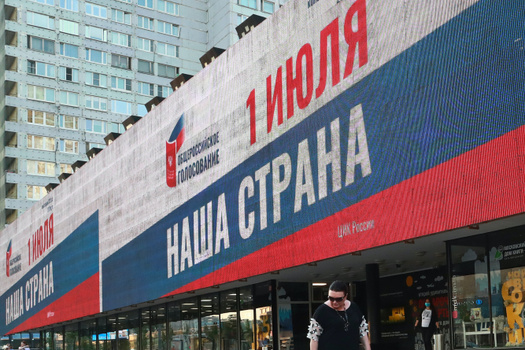
Leaked documents reveal Moscow government’s involvement in forced voter registration
Мы рассказываем честно не только про войну. Скачайте приложение.
Moscow’s Department of Information Technology (DIT) is using an online system to track how many government employees have registered to vote in Russia’s July 1 plebiscite on constitutional amendments. Now, opposition politician Alexey Navalny has published copies of tables containing this data, claiming that the documents were sent to him from the Moscow DIT.
The two tables that Navanly published show data collected from dozens of Moscow’s state-funded organizations. The tables show how many employees are working in each branch, how many of them are registered as residents in Moscow and beyond the city limits, and how many have filed applications for voting. There is a separate table for “citizen engagement” — a list of people who are campaigning for the employees of each organization to vote.
For example, on June 15, the city’s water company “Mosvodokanal” — which employs 12,480 people — received confirmation that 89.5 percent of its employees had applied to vote, in addition to recruiting another 20,561 potential voters from among their friends and family members. Meanwhile, the city’s waste management company “Mosekoprom” — which employs just 25 people — received confirmation that all of its employees had applied to vote, along with 80 additional people. That said, the tables don’t contain the full names or other personal data about specific people, only the number of individuals who have registered at particular organizations.
In addition to the tables, Navalny published people’s stories about how they themselves or their family members were forced to participate in voter registration. Judging by these anecdotal reports, civil servants aren’t the only ones being forced to vote — it’s happening in the private sector too. At some businesses, those who do not want to register themselves for online voting are being threatened with penalties, including dismissal, while those who file their own applications and “bring a friend” are being promised “a bonus, or some kind of promotion.”
Media outlets, including Meduza, have previously reported that Moscow’s civil servants were being forced to register for online voting ahead of the July 1 plebiscite on constitutional amendments, while urging their friends and family members to the same. The head of Moscow’s Community Headquarters for Election Monitoring, Ilya Massukh, called this “over-fulfillment.” According to him, the heads of government organizations have no right to force their subordinates to vote — they can only offer them information. However, if the data is authentic and actually used by the Moscow DIT, the tables Navalny published indicate that the Moscow Mayor’s Office is controlling a system of coercion aimed at making sure civil servants cast their ballots.
Summary by Olga Korelina
Translation by Eilish Hart
(1) Are they authentic?
While the authenticity of the documents remains unknown, in 2019, Navalny’s Anti-Corruption Foundation (FBK) received a list of voters who were given access to online voting during the Moscow City Duma Elections. Meduza later confirmed the authenticity of this document. The list was almost exactly the same as the DIT data provided by the Moscow Mayor’s Office.
(2) Why this data in particular?
Muscovites (as well as residents of the Nizhny Novgorod region) are allowed to participate in the vote on constitutional amendments online, but residents of Russia’s other regions are not. As Navanly points out, employees working for Moscow’s municipal organizations who are registered, for example, as residents of the Moscow region, are asking to receive absentee ballots and vote at their work place in the capital.
(3) What kind of confirmation?
Earlier, reports emerged that government employees were required to send in screenshots of their voter applications submitted through the city’s server mos.ru or the government portal “Gosuslugi” as proof of registration.